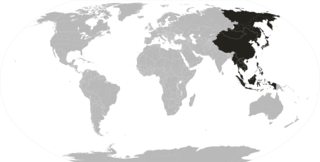
The Far East is the geographical region that encompasses the easternmost portion of the Asian continent, including East, North, and Southeast Asia. South Asia is sometimes also included in the definition of the term. In modern times, the term Far East has widely fallen out of use and been substituted by Asia–Pacific, while the terms Middle East and Near East, although now pertaining to different territories, are still commonly used today.

Peking University (PKU) is a public university in Haidian, Beijing, China. It is affiliated with and funded by the Ministry of Education of China. The university is part of Project 211, Project 985, and the Double First-Class Construction. It is also a member in the C9 League.

Cai Yuanpei was a Chinese philosopher and politician who was an influential figure in the history of Chinese modern education. He made contributions to education reform with his own education ideology. He was the president of Peking University, and founder of the Academia Sinica. He was known for his critical evaluation of Chinese culture and synthesis of Chinese and Western thinking, including anarchism. He got involved in the New Culture, May Fourth Movements, and the feminist movement. His works involve aesthetic education, politics, and education reform.
Tu Weiming is a Chinese-born American philosopher. He is Chair Professor of Humanities and Founding Director of the Institute for Advanced Humanistic Studies at Peking University. He is also Professor Emeritus and Senior Fellow of Asia Center at Harvard University.
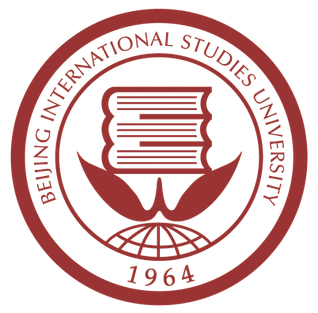
Beijing International Studies University is a municipal public college of foreign languages in Chaoyang, Beijing, China. It is affiliated with the City of Beijing, and co-funded by the Beijing Municipal People's Government and the Ministry of Culture and Tourism.
Photography in China dates back to the mid-19th century with the arrival of European photographers in Macao. In the 1850s, western photographers set up studios in the coastal port cities, but soon their Chinese assistants and local competition spread to all regions.

Kwang-chih Chang, commonly known as K. C. Chang, was a Taiwanese-American archaeologist and sinologist. He was the John E. Hudson Professor of archaeology at Harvard University, Vice-President of the Academia Sinica, and a curator at the Peabody Museum of Archaeology and Ethnology. He helped to bring modern, western methods of archaeology to the study of ancient Chinese history. He also introduced new discoveries in Chinese archaeology to western audiences by translating works from Chinese to English. He pioneered the study of Taiwanese archaeology, encouraged multi-disciplinal anthropological archaeological research, and urged archaeologists to conceive of East Asian prehistory as a pluralistic whole.

Matteo Ricci was an Italian Jesuit priest and one of the founding figures of the Jesuit China missions. He created the Kunyu Wanguo Quantu, a 1602 map of the world written in Chinese characters. In 2022, the Apostolic See declared its recognition of Ricci's heroic virtues, thereby bestowing upon him the honorific of Venerable.

Chi Wang (1930–2024) was a professor of U.S.-China relations and modern China at Georgetown University, where he contributed to the establishment of Georgetown's PhD program in Asian History and was co-chair of the U.S.-China Policy Foundation. Established in 1995, the foundation supports various activities through its Committee for U.S. Libraries and Museum Exchange. At Georgetown, Wang also contributed to the establishment of Georgetown's PhD program in Asian History. Wang was the head of the Chinese Section at Library of Congress and worked in the field of librarianship for forty-eight years before retiring from LC in October 2004.

Ji Xianlin was a Chinese Indologist, linguist, paleographer, historian and writer who has been honored by the governments of both India and China. Ji was proficient in many languages including Chinese, Sanskrit, Arabic, English, German, French, Russian, Pali and Tocharian, and translated many works. He published a memoir, The Cowshed: Memories of the Chinese Cultural Revolution, about his persecution during the Cultural Revolution.
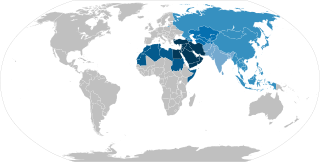
In sociology, the East–West dichotomy is the perceived difference between the Eastern and the Western worlds. Cultural and religious rather than geographical in division, the boundaries of East and West are not fixed, but vary according to the criteria adopted by individuals using the term.

The history of the missions of the Jesuits in China is part of the history of relations between China and the Western world. The missionary efforts and other work of the Society of Jesus, or Jesuits, between the 16th and 17th century played a significant role in continuing the transmission of knowledge, science, and culture between China and the West, and influenced Christian culture in Chinese society today.
East Asian literature is the diverse writings from the East Asian nations, China, Japan, Korea, Mongolia and Taiwan. Literature from this area emerges as a distinct and unique field of prose and poetry that embodies the cultural, social and political factors of each nation. Prose within East Asian countries reflects the rich cultural heritage from which specificities of language, form and style shape writings. Similarly, East Asian poetry exemplifies how the diverse culture and distinct environments influence East Asian Literature. Reflected through the poetic forms, images and language employed in writings. The development of East Asian literature has been subjugated to both local and international influences. The presence of Western literature and the transnational exchange reflects an interrelationship in which East Asian Literature has benefited from the communication of ideas and perspectives as well as contributed to broader literature movements.
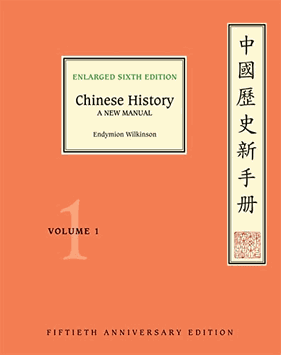
Chinese History: A New Manual, written by Endymion Wilkinson, is an encyclopedic and bibliographic guide to Sinology and Chinese history. The New Manual lists and describes published, excavated, artifactual, and archival sources from pre-history to the twenty-first century, as well as selected up-to-date scholarship in Chinese, Japanese, and Western languages. Since its first appearance in a preliminary 1973 version, Wilkinson's manual has been continuously in print; it was most recently published in a 6th, 50-year Anniversary edition for 2022.

Endymion Porter Wilkinson is a British sinologist and diplomat who served as the European Union Ambassador to China and Mongolia from 1994 to 2001. He is particularly noted for Chinese History: A New Manual, the first version of which appeared in 1973, an authoritative guide to Sinology and Chinese history for which he was awarded the Prix Stanislas Julien for 2014. The 2022 revised and enlarged Sixth Edition consists of two volumes, 1.7-million-words, covering topics, primary sources, and scholarship from earliest times to 1976.
Ming Dong Gu is Katherine R. Cecil Professor in the School of Arts, Humanities, and Technology at the University of Texas at Dallas. He is a Chinese-born scholar of comparative literature and thought. He received his doctorate from the University of Chicago and has taught at various U.S. universities and colleges. He has a wide range of scholarly interests covering English literature, Chinese literature, comparative literature, literary theory, comparative thought East and West, fiction theory, hermeneutics, postcolonial studies, psychoanalytic criticism, and cross-cultural studies.

Roger T. Ames is a Canadian-born philosopher, translator, and author. He is Humanities Chair Professor at Peking University in Beijing, China, Professor Emeritus of Philosophy at the University of Hawaiʻi at Mānoa, and a Berggruen Fellow. He has made significant contributions to the study of Chinese and comparative philosophy, in which he emphasizes the importance of understanding Chinese philosophy on its own terms rather than through the lens of Western philosophy.
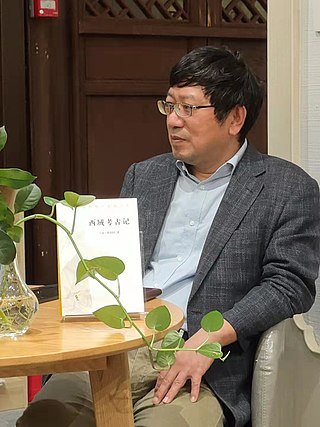
Rong Xinjiang is a Chinese historian who is a professor at Peking University, currently serving as chairperson of Academic Committee of Department of History and chairperson of Center for Research on Ancient Chinese History. He is also the Cheung Kong Scholars Distinguished Professor of the Ministry of Education, vice chairperson of the Tang Dynasty Institute of China and the Dunhuang and Turpan Institute of China.
Anschauung is a German concept that is usually translated as "intuition". It, however, connotes a more nuanced definition especially when the concept is applied to philosophical discourse, including quantum theory. Some of the translations include actual, sense impressions, contemplation, view, opinion, and notion. Anschauung is also an important component of Johann Gottlieb Fichte's doctrine of knowledge.
The eastward spread of Western learning refers to the spread of Western technologies and ideologies in China since the late Ming dynasty, which is contrast with the westward spread of Eastern learning that introduced Chinese technologies and ideologies to the West.














